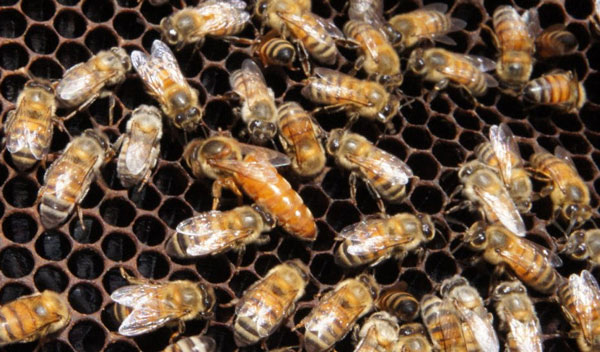Do We Have “Killer Bees” in our Region?
By Chris Williams on June 5, 2013.

Question
I just heard on the news about a guy who was killed by killer bees when he disturbed a nest while on his tractor. Do we have killer bees here in the Northeast and how can you tell them from regular honey bees?
Answer
We do not have killer bees (the proper term is Africanized bees) here in the Northeast. The bees first moved into Texas from Mexico in 1990. Since then, Africanized bees have gradually moved northward while interbreeding with our European honey bees. They now occupy most of the Southwestern U.S., including parts of southern California and Nevada, and parts of southern Florida. The bees move north at about the rate of one mile a day but almost certainly will never make it this far north. Africanized bees aren’t able to overwinter in cold regions like European bees, so winter temperatures will limit their northward range.
After lots of media hype when the bees first entered the U.S. many years ago, they have failed to live up to the fearful expectations. There have been Africanized bee and human encounters and there have been occasional deaths as a result, but most people in Africanized bee areas are unaffected by their presence. Most beekeepers in Africanized bee areas have learned how to handle the temperamental bees even though they are much harder to maintain than the more docile European honey bees.
Africanized bees look like our regular European honey bees, but are slightly smaller. Their venom is no more toxic than European bee venom, it’s just that a person or animal is much more likely to receive multiple stings when Africanized bees are involved. Most people can tolerate 15-25 bee stings without requiring medical treatment, unless they have a systemic allergic reaction. People that have died from Africanized bee stings typically receive hundreds or thousands of stings. The incident you mention involved a Texas man who was using his tractor to push an old chicken coop off of his property. The Africanized bees nesting in the coop attacked, quickly stinging the man thousands of times on his face and arms.
Why Africanized Bees Are So Scary
Honeybees, whether they are European or Africanized, only sting defensively. They sting when there is a perceived threat to the hive. But, compared to our native honey bees, Africanized bees are much more protective of their hive and require less provocation to attack. They guard their hive more aggressively with a larger alarm zone around the hive and a higher proportion of guard bees in the hive. They also pursue people and animal threats for up to 100 yards from the hive, compared to a distance of 20 yards for other honey bees. Since a person running from Africanized bees will be chased for a greater distance by more bees, he will almost certainly receive more stings than if the bees were European honey bees.
Photo credit: Thiago Gama Oliveira / Foter.com / CC BY-NC-SA